Publish to WeChat Mini Games
Note: some platforms only have Chinese documentation available when visiting the platform's website. It may be necessary to use Google Translate in-order to review the documentation.
The runtime environment of the WeChat Mini Game is an extension of the WeChat Mini Program, providing a WebGL interface encapsulation based on the mini program environment, greatly improving rendering capabilities and performance. However, since these interfaces are encapsulated by the WeChat team, they are not equivalent to the browser environment.
On the engine side, in order to make the developers' workload as easy as possible, our main tasks for developers include the following:
- The engine framework adapts to the WeChat Mini Game API, pure game logic level, developers do not need any additional modifications.
- The Cocos Creator editor provides a fast packaging process, released directly as a WeChat Mini Game, and automatically evokes the WeChat DevTools.
- Automatically load remote assets, cache assets, and cache asset version control.
In addition, the game submission, review and release process of the WeChat Mini Game is no different from the WeChat Mini Program. Please refer to the WeChat Mini Game Developer documentation.
Publish WeChat Mini Games with Cocos Creator
Download the WeChat DevTools on WeChat Official Document
Set the WeChatGame App Path in Cocos Creator -> Preferences -> Native Develop.
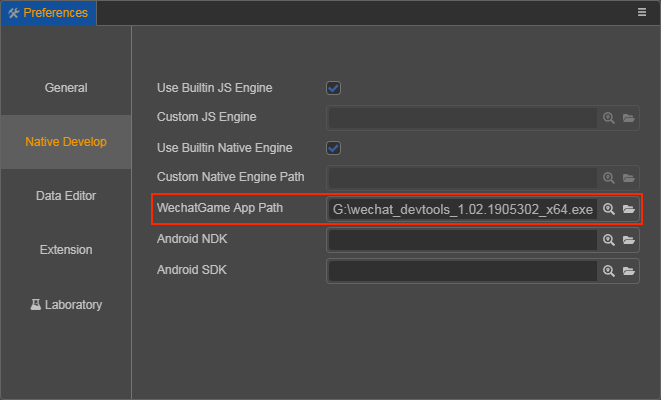
Log in to the WeChat public platform and find the appid
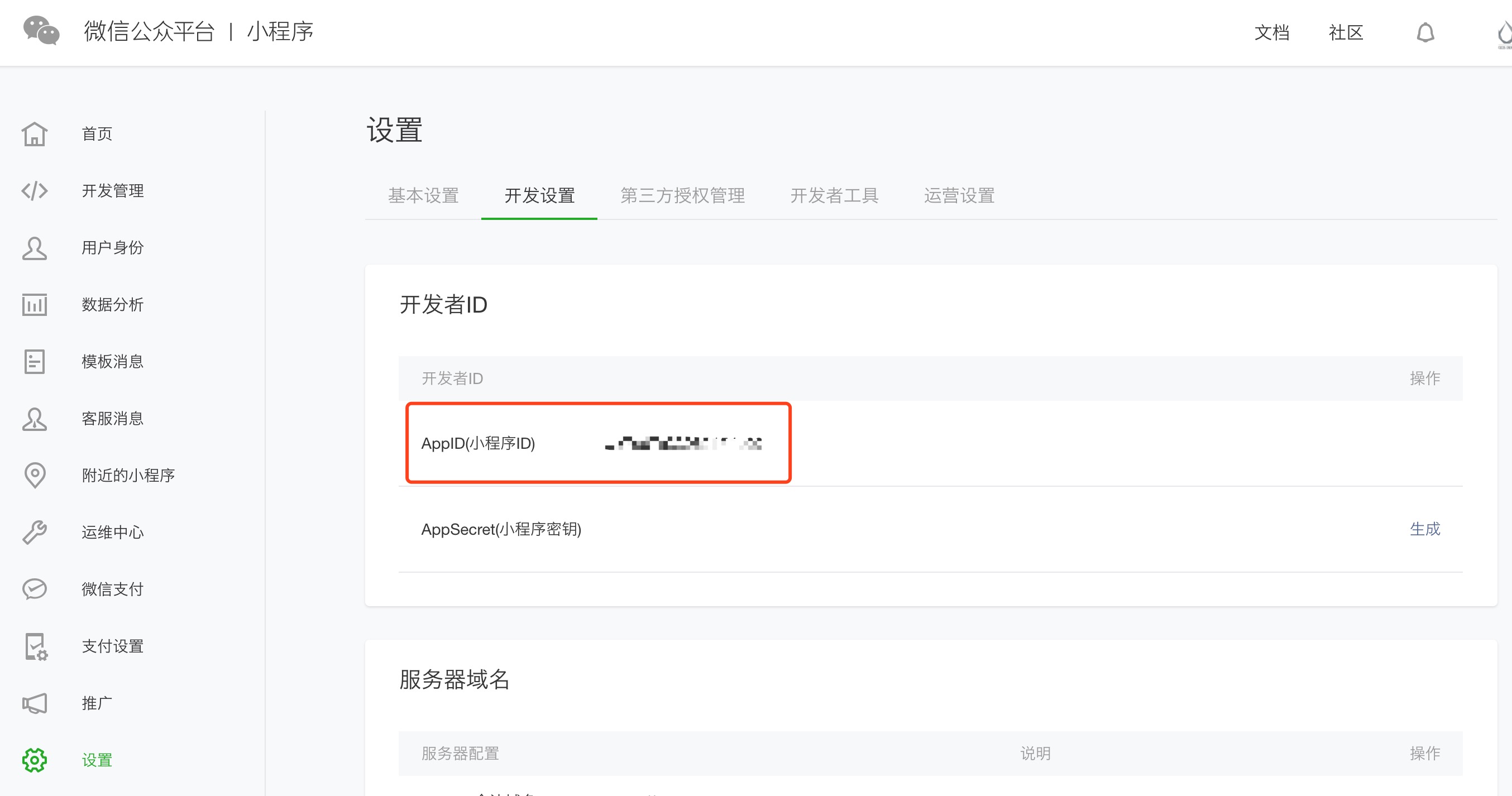
Select the WeChat Game in the Platform of the Build panel, fill in the
mini game appid, and then click Build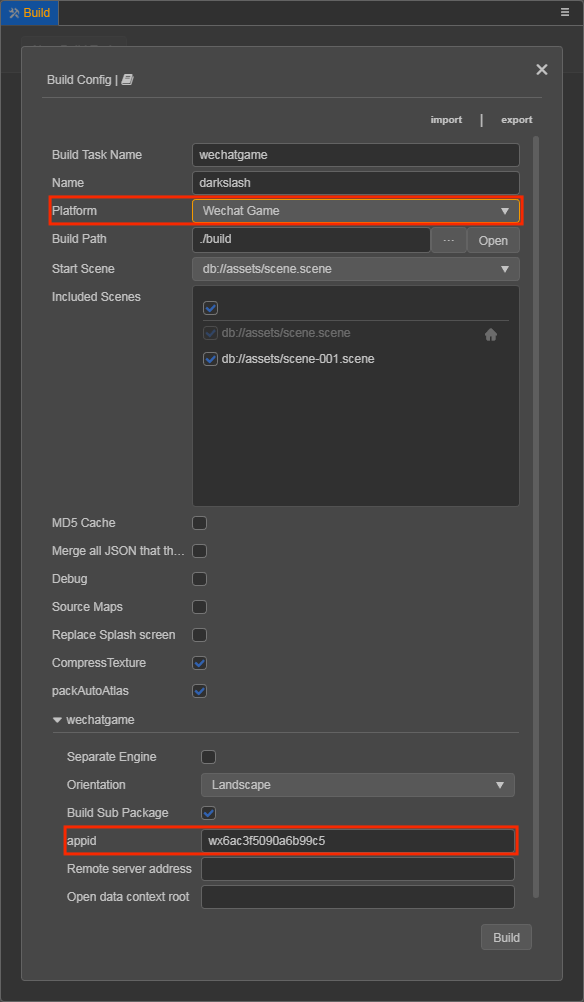
Click Play to open the WeChat DevTools
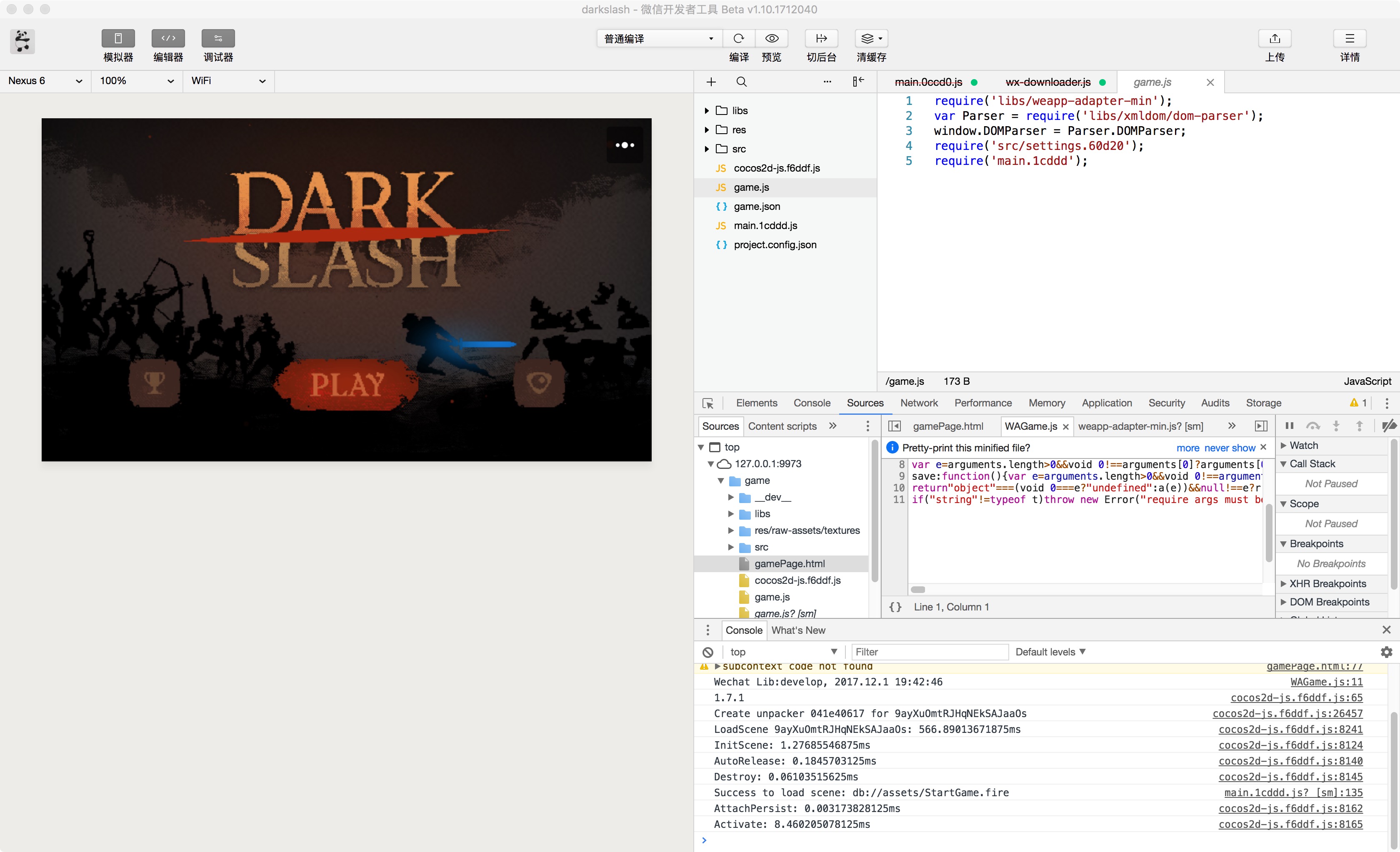
Note: the WeChat DevTools, if it has not been run on a Mac before, will show an error that states:
Please ensure that the IDE has been properly installed. You need to manually open the WeChat DevTools once, before you can click Run.Preview deployment
Following this process, a
wechatgamefolder will be generated in the project's build directory (the name of the folder is based on the Build Task Name), which already contains the configuration filesgame.jsonandproject.config.jsonof the WeChat Mini Games environment.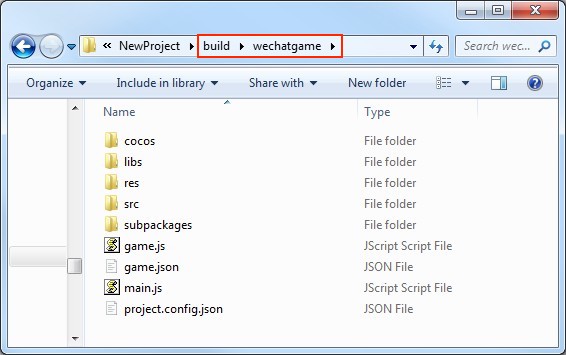
Build Options
| Options | Optional or not | Default | Explanation |
|---|---|---|---|
| appid | Required | wx6ac3f5090a6b99c5 | The appid of the WeChat Mini Games, it will be written to project.config.json file. |
| Start Scene Asset Bundle | Optional | false | If set, the start scene and its related dependent resources are built into the built-in Asset Bundle — start-scene to speed up the resource loading of the start scene. |
| Remote server address | Optional | Empty | The remote server address. assets will then be obtained from this address. |
| Open data context root | Optional | Empty | If an Open Data Context exists, use this root to specify the relative path of the Open Data Context folder in the build directory so that the directory is not overwritten or modified during the build. |
| Orientation | Required | landscape | Device orientation, it will be written to game.json file. |
| Separate Engine | Optional | Empty | Whether to use WeChat Mini Games engine plugin, please refer to WeChat Mini Games Engine Plugin Instructions for details. |
| Wasm physics experimental | Optional | js | This option is used to select the usage mode of bullet (ammo.js) physics, which currently includes js, fallback, and wasm, please refer to the WebAssembly Support section below for more details. |
Asset Management for WeChat Mini Game Environment
In a WeChat Mini Game environment, asset management is the most special part. It differs from the browser in the following four points:
The size of the WeChat Mini Game package cannot exceed 4MB, including all the code and assets. Additional assets must be downloaded via web request.
For files downloaded from a remote server, the WeChat Mini Game environment does not have the browser's caching and outdated update mechanism.
For the assets in the WeChat Mini Game package, they are not loaded on demand in the mini game environment, but rather all the assets in the package are loaded at once, and then the game page is launched.
You cannot download script files from a remote server.
This brings up two key issues, home page loading speed and remote asset caching and version management. For the home page loading speed, we recommend that developers only save the script file in the WeChat Mini Game package, and all other assets are downloaded from the remote server. As for downloading, caching and version management of remote assets, Cocos Creator has done the job for developers.
In the WeChat Mini Game environment, we provide a wxDownloader object, and after setting the REMOTE_SERVER_ROOT property to it, the logic of the engine to download assets becomes:
- Check that assets are in the mini game package.
- If not present, query local cache assets.
- If no local cache assets are available, download from a remote server.
- Download and save them to the mini game application cache in backstage for re-access.
- Local cache storage has space limitation, if total space of cache exceeds the limit, there will be no more caching without disturbing game process.
It should be noted that once the cache space is full, all the assets that need to be downloaded cannot be saved, only the temporary files for save download assets can be used, and WeChat will automatically clean up all temporary files after the mini game is exited. So the next time you run the mini game again, those assets are downloaded again and the process keeps looping.
In addition, the problem of file saving failure due to cache space exceeding the limit does not occur on the WeChat DevTools, because the WeChat DevTools does not limit the cache size, so testing the cache needs to be done in a real WeChat environment.
At the same time, when the MD5 Cache feature of the engine is enabled, the URL of the file will change as the content of the file changes, so that when a new version of the game is released, the assets of the old version will naturally become invalid in the cache, and only the new assets can be requested from the server, which achieves the effect of version control.
Specifically, developers need to do:
When building, check the MD5 Cache in the Build panel.
Set the Remote service address, and then click Build.
When the build is complete, upload the res folder in the mini game release package to the server.
Delete the res folder inside the local release package.
For the test phase, you may not be able to deploy to the official server, you need to use the local server to test, then open the details page in the WeChat DevTools, check the
Does not verify valid domain names, web-view (business domain names), TLS versions and HTTPS certificatesoption in the Local Settings.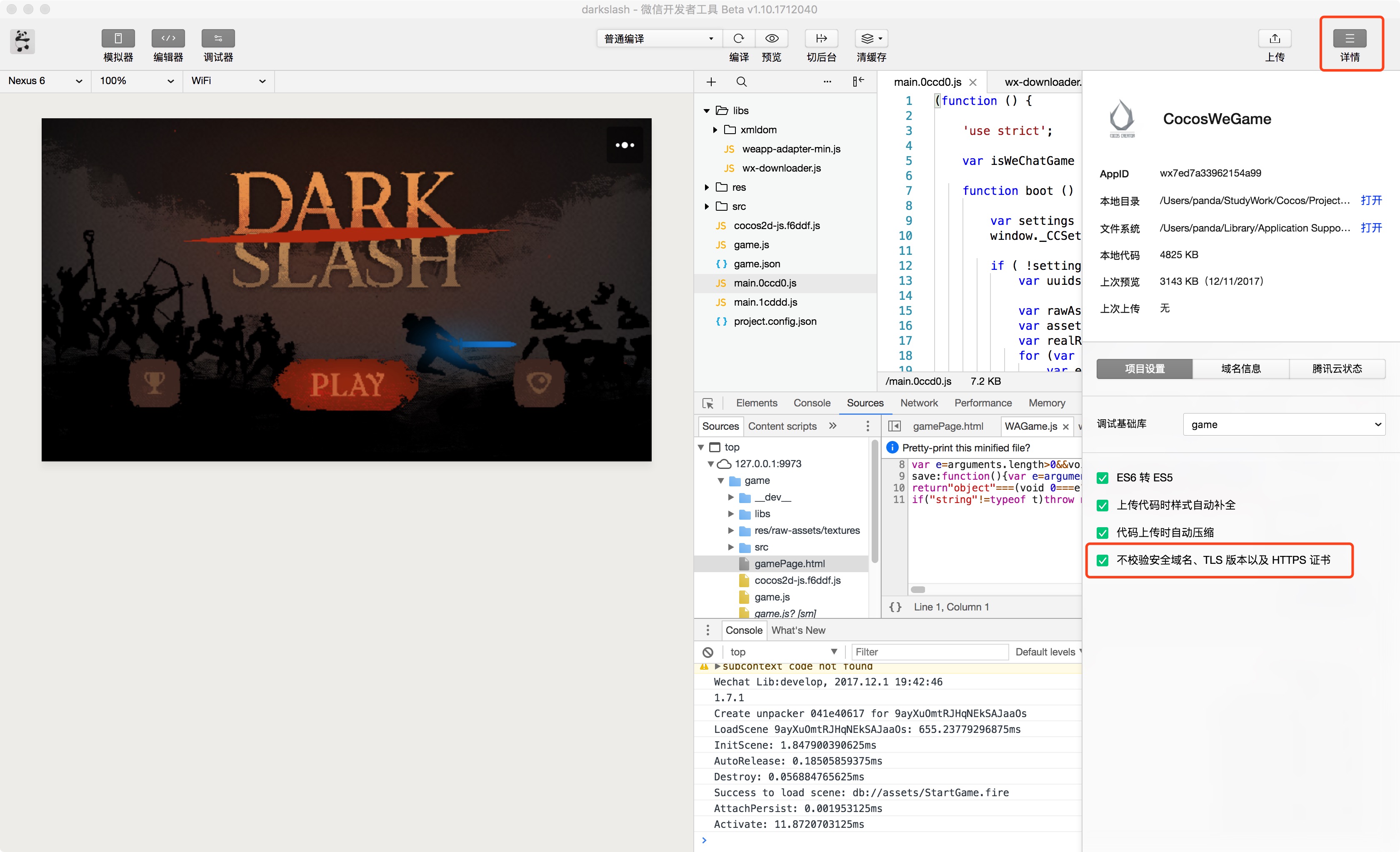
Note: if the cache asset exceeds the WeChat environment limit, you need to manually clear the asset. Use
wx.downloader.cleanAllAssets()andwx.downloader.cleanOldAssets()to clear the cache in WeChat Mini Games. The former clears all the cache assets in the cache directory, please use it carefully. While the latter clears cache assets that are currently unused in the cache directory in the application.
WeChat Mini Game Subpackage Loading
To achieve subpackage loading with WeChat Mini Game, please refer to Mini Game Subpackage documentation.
Platform SDK Access
In addition to pure game content, the WeChat Mini Game environment actually provides a very powerful native SDK interface, the most important of which are user, social, payment, etc. These interfaces are only available in the WeChat Mini Game environment, equivalent to third-party SDK interfaces for other platforms. The porting of such SDK interfaces still needs to be handled by developers at this stage. Here are some of the powerful SDK capabilities provided by WeChat Mini Games:
- User interface: login, authorization, user information, etc.
- WeChat payment
- Forward and get forwarding information
- File upload and download
- Media: pictures, recordings, cameras, etc.
- Other: location, device information, scan code, NFC, etc.
WeChat Mini Games Known issues
Cocos Creator's adaptation of WeChat Mini Games has not been completely implemented. The following modules are still not supported:
- VideoPlayer
- WebView
It is possible to use the missing functionality by calling the WeChat's API directly.
WebAssembly Support
As of 3.0, the Wasm physics experimental option has been added to the WeChat Mini Game builds. It is a laboratory feature for choosing the usage mode of bullet (ammo.js) physics:
- js: Use js mode, this is consistent with previous versions.
- fallback: Automatic fallback mode, use wasm in an environment that supports wasm, or revert to js.
- wasm: Use wasm mode.
In fallback mode, the editor packs the code for wasm and js modes, and the corresponding code packages for the two modes are 1.2MB and 0.7MB respectively, totaling nearly 2MB, which greatly affects the 4MB limit of the main package.
The solution is to reduce the pressure on the main package by configuring the subpackage, taking the ammo-82499473.js file as an example of a subpackage:
Modify
game.jsonts{ //*, "subpackages": [{ "name": "ammo", "root": "cocos-js/ammo-82499473.js" }] }Modify the
initfunction ingame.jstswindow.__globalAdapter.init(function() { fsUtils.loadSubpackage('ammo', null, (err) => { System.import('./cocos-js/ammo-82499473.js').then(() => { return System.import('./application.js').then(({ createApplication }) => { return createApplication({ loadJsListFile: (url) => require(url), loadAmmoJsWasmBinary, }); }).then((application) => { return onApplicationCreated(application); }).catch((err) => { console.error(err); }); }) }); });
Notes:
- The WeChat Separation Engine plugin currently only supports js mode.
- WebAssembly required WeChat v7.0.17 and above.
- The WeChat WebAssembly debugging base library needs to be v2.12.0 and above.
- Fallback mode is recommended for the most comprehensive device support.